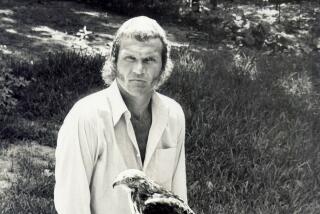Hint of Hemingway in Original Horror Show
- Share via
“You wake up in this here world, my sweet li’l mister, you got to wake up tough. You go out the front door tough of a mornin’ and you stay tough’ til lights out--have you learned that?” This is the maternal advice Glenda Atkins offers her 13-year-old son, Shug, early on in “The Death of Sweet Mister,” Daniel Woodrell’s fiery, poetic, hair-raising novel.
Fat, dreamy and lost, Shug lives with his mom in a small house on the edge of an Ozark Mountains cemetery, or “bone orchard,” as he calls it. He spends his days tending the graves and carefully witnessing, practically cringing, at his mother’s wanton ways.
For a time, the two cohabit with one of recent literature’s true monsters, the vile and violent Red, a dangerous drunk who in between mercilessly berating the fat little boy, yelping fragments of old rock ‘n’ roll and catting around with his buddies, enlists the youngster’s help in a series of small-town robberies to steal the prescription drugs of the sick town folks. Red, the small boy can’t help noticing, “had the muscles of a man and all those prowling hungers and meannesses.”
Woodrell’s story is told from Shug’s point of view. At first, his lyric, sometimes comic musings seem improbable, but his voice rings so true and clean and the prose is so sharp and spikey that any doubts quickly fade as we enter into this dangerous and memorable mountain world. It’s a place where Shug doesn’t simply mow the lawn around a graveyard: He “shaved the fuzz from the entire dead.” Wild flowers “pose tall and prissy amongst the weeds.”
The voice of Woodrell’s sad narrator has a hint of Hemingway in its plainness and its awe of nature, a little of the cracked Southern nastiness of Barry Hannah and shades of the old, high Faulknerian gothic. But Woodrell, who has written six previous novels, including “Give Us a Kiss” and “Tomato Red,” is original in this prosaic horror show.
His story starts slowly and seems at first more of a tone poem than a novel. But little signs and omens accumulate, and a frightening dramatic tension builds during sharp scenes of mean rusticity. Shug observes the nasty bantering of Red and Glenda, the three drive semi-aimlessly through the low woods, they pick berries, the men go on a preposterous fishing trip and shoot frogs for their leg meat. The sense of doom and enclosure builds through the series of idiotic robberies, the appearance of a few strange interlopers and relatives and, frighteningly, in the boy’s growing obsession with the curves of his mother’s supple body.
The story is nervy and yet feels true. It is spare but at the same time comes at a sly slant. It seems to participate in certain tropes and truisms of deep Southern storytelling and yet one turns the pages with a sickening foreboding.
The peril that leeches off of Red is especially portentous and scary as the ding-dong of trouble ahead mounts for Shug. “Red gave me that steady steady look of his that left me feeling already the worms underground spiraling into my eyeballs and brain and the soft meat of me. That look he had that warned of swift death which lasts so long.”
Shug and Glenda’s downward spiral picks up steam when the necessary stranger comes into their lives, riding a sleak green Thunderbird. (All the men here have a lusty soft spot for old cars.) Jimmy Van is a wayward cook on the make who would like to rescue the family by heading to New Orleans.
For sure, this agent of provocation is at the corner of a spooky triangle. Maybe he will shelter Glenda from the storms in her life. Perhaps he will protect Shug from Red and bring some rough country justice.
But for a mother and son living on the side of a Southern cemetery, deliverance doesn’t really figure in the equation. After all, as Shug says, “Every window we had opened onto a vista of tombstones. . . . I believe dusks and dawns spent staring out that window shaded me ever more towards no-good and lonely.”
More to Read
Sign up for our Book Club newsletter
Get the latest news, events and more from the Los Angeles Times Book Club, and help us get L.A. reading and talking.
You may occasionally receive promotional content from the Los Angeles Times.









